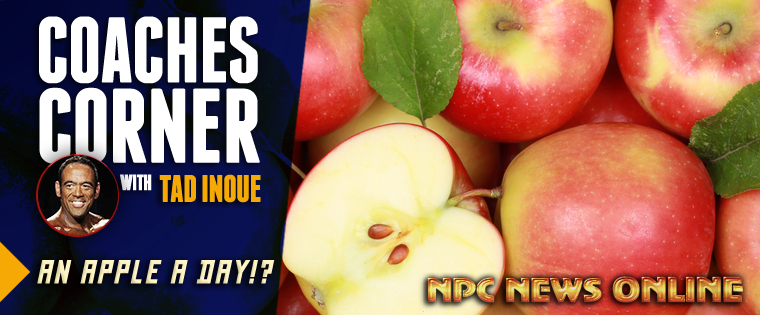An Apple A Day!?
By Tad the Diet Coach
It used to be said, “An apple a day, keeps the Dr away.” but this is less true than you might think if that apple turns into bushels a day. Today we have so many sources of fructose in our daily lives. Soda being the most readily available source in the form of high fructose corn syrup. The problem becomes the volume of this kind of sugar that is so easily ingested and the negative consequences of taking in high amounts of this kind of sugar. Not to mention, fructose isn’t processed the same as other forms of sugar in our bodies which has serious consequences if ingested in high amounts.
The sugar found in fruit, fructose, is a wonderful low glycemic sugar in moderation, but there are a few caveats that you must take into consideration before consuming fructose in your diet. Fructose is primarily processed in the liver and our body’s don’t handle larger amounts of fructose well. If too much is present then the body is signaled to start producing triglycerides out of the excess fructose. This is bad if you are trying to lose body fat, stay lean, and if you don’t want to increase your risk for heart disease.
 A high triglyceride count is a cardiovascular risk factor. High lipid profiles can result in cardiovascular disease, heart attack and increased risk of stroke. This is caused when high amounts of fructose are ingested and our bodies are then signaled to create some destructive lipids. Over time a high lipid count, particularly high LDLs can cause heart disease via hardening of the arteries and eventually coronary artery blockage.
A high triglyceride count is a cardiovascular risk factor. High lipid profiles can result in cardiovascular disease, heart attack and increased risk of stroke. This is caused when high amounts of fructose are ingested and our bodies are then signaled to create some destructive lipids. Over time a high lipid count, particularly high LDLs can cause heart disease via hardening of the arteries and eventually coronary artery blockage.
Despite some negative consequences to over eating fructose, fructose does have a low insulin response and is very low on the glycemic index scale. However because of this low insulin response and that fructose is primarily processed in the liver, fructose also doesn’t stimulate appetite satiety very well, so you are more likely to over eat your portion sizes and still feel hungry when fructose is abundant in your meals. Additionally, over time with too much fructose in your diet there is strong evidence that suggests it can encourage insulin resistance and eventually type II diabetes. This can also lead to excessive body fat gains, and again increased cholesterol and LDLs and thus increased cardiovascular disease risks. While lots of fructose in your daily diet can lead to disease risk factors and undesirable body results, you CAN integrate fruit into your diet in a way that adds value.
First, you must select the right kind of sources. Choosing fruit sources that are less dense in sugars are better choices that will fill you up and create satiety in your meals without running the risk of over eating your meals with fructose. Fruits that are less dense that make good choices can include berries of any kind, melons, and most citrus fruits. These sources are less dense calorically and are easier to mediate in your diet.
Second, remember that portion size is everything. Use self restraint and don’t allow  yourself to consume more than twenty percent of your daily carbohydrate intake as fruit. This will allow you a fruit or two in your day without going overboard. So for a diet with 200 grams of carbohydrates a day, 40 gm of carbs from fruit a day would be very safe. This quantity of carbs would equate to 1 cup of berries and a citrus fruit like an orange or grapefruit, or one medium banana and a cup of melon a day. Conversely, one average soda has about 50-60 grams of sugar from primarily fructose related sources. This one 16 oz soda just fulfilled your daily intake of fructose, so you can see how easy it is to overdo your fructose intake if you are drinking sugar soda regularly.
yourself to consume more than twenty percent of your daily carbohydrate intake as fruit. This will allow you a fruit or two in your day without going overboard. So for a diet with 200 grams of carbohydrates a day, 40 gm of carbs from fruit a day would be very safe. This quantity of carbs would equate to 1 cup of berries and a citrus fruit like an orange or grapefruit, or one medium banana and a cup of melon a day. Conversely, one average soda has about 50-60 grams of sugar from primarily fructose related sources. This one 16 oz soda just fulfilled your daily intake of fructose, so you can see how easy it is to overdo your fructose intake if you are drinking sugar soda regularly.
Finally, this is more of a caution than a directive for fruit selection, watching your labels and knowing where the sugar sources come from in your foods will help you understand what is going on with your body and your body’s responses to the foods you consume. Watch your labels and avoid high fructose corn syrup, sugar (most are derived from fructose sources), and any fructose based sweeteners. Overall, this will enable you to add small amounts of healthy fruits to your daily diet without the negative consequences of accidentally over consuming this unique but healthy sugar. Fruit is a very healthy and needed carbohydrate, and can be safely added to a contest diet or healthy lifestyle, but good choices, moderation and avoiding too much processed forms of fructose are the keys to keeping this kind of food in your diet safely without some of the potential health risks.
Tad Inoue is a professional prep coach for figure, fitness, bikini, physique and bodybuilding. Tad has over 28 years of experience in the fitness industry as a nutritionist, diet coach, trainer, competitive bodybuilder and coach. For more information on diet coaching with Tad Inoue please go to www.TadtheDietCoach.com or email at Tad@Tadthedietcoach.com.
Always consult your doctor before beginning this or any training or diet/supplement program.
It is important to check with your healthcare practitioner before beginning any diet or exercise program.
These programs may not be appropriate for all individuals.
The content we provide is to help you broaden your understanding and knowledge of the health and fitness topics discussed on our website. This information should not be considered to be exhaustive of a particular topic, and should never be used in place of a visit or call to, consultation with or advice from your physician or other health care provider. We strongly recommend that you consult a health care professional prior to using any information or advice contained on this website that sets forth, illustrates, or suggests a particular diet, fitness program, workout regimen or activity. Further, we do not recommend the self-management of health problems because of the advice or recommendations contained in this magazine. You should never disregard medical advice or delay in seeking it because of something you have read on this website.
We do not assume any liability for injuries that may occur while using any information contained on this website, regardless of whether a doctor was consulted.




